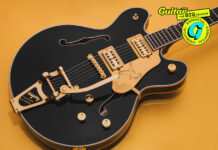
“My love for the guitar led me to exploring its edges” how Jacob Collier is redefining the guitar for his unique purposes
Quincy Jones, Steve Vai, T-Pain, John Mayer, Snarky Puppy, Olivia Rodrigo, SZA… what do they all have in common? Well this almost comically diverse set of artists – and many more besides – seem to agree on one thing: there’s something special about Jacob Collier.
READ MORE: Militarie Gun: the band that exploded out of the pandemic to become one of the exciting live bands in hardcore
In the decade since the then-teenage London multi-instrumentalist wowed the internet with his remarkable multi-part harmony covers of classic songs, he’s demonstrated himself to be a musician of rare and magical gifts. Very few people seem to click with music the way Collier does – weaving almost unfathomably dense multi-part harmonies, counter rhythms, instruments and time signatures into musical patchwork quilts.
It’s a radically individual approach to making music that has won him a hatful of Grammys, but also inspired countless other musicians to broaden their horizons and explore a new galaxy of sonic possibilities. But what do you do when you’ve pretty much completed music as a discipline?
Well, apparently you take up the guitar – but not just any guitar. As befits an artist who has invented various new instruments to allow him to give form to his musical vision, Collier’s first signature instrument is a fanned-fret, headless yellow Strandberg with five strings tuned to DAEAD. What did you expect, really?
Jacob Collier with his signature Strandberg Boden JC 5 Djesse
New Horizons
“I’m relatively new to the guitar, actually,” Collier explains down the Zoom line, having recently returned from the US leg of his Djesse Vol. 4 world tour. The album, which is his fifth in total and fourth and final instalment to his irrepressible Djesse series, came out in February along with a tidal wave of mixed emotions for the musician. “It’s the end of a colossal journey for me, the foundations of which I first dreamed up over six years ago,” he posted when the album was released. “More than ever, this feels like the start of an adventure, rather than the conclusion of one. The end of the beginning, perhaps.”
That new journey, it would seem, will begin with a guitar in his hand. It’s a departure for an artist who – while admittedly putting the ‘multi’ in multi-instrumentalist – has often been more associated with pianos and synthesizers, but one that speaks to the enduring power that the guitar has over us all.
“I think it was partly my love for the guitar at this time in my life that led me to exploring its edges,” he explains. “By that, I mean understanding how to mix distortion and all of the nuance that comes with these frequencies that are involved across the spectrum, and where to put them in the mix. It was a new experiment for me.”
Stradberg was a natural partner for someone interested in pushing the envelope in terms of guitar – the Swedish brand has long supported the vision of artists who want to do unconventional things, from Plini to Meshuggah, but this was something altogether different. The idea was to make an instrument that was both accessible and funky, that tapped into the childlike wonder that playing a guitar inspires in all of us that first time around, but to do so for everyone by pushing things out of the norm.
Jacob Collier’s signature Strandberg Boden JC 5 Djesse
They settled on a five-string model (a first for Strandberg, who are more used to adding strings on to guitars than taking them away) that was designed to challenge the traditional recipe of chordal voicings and fingering patterns and offer up new tonal possibilities.
“Back in 2016/17, I had figured out a way for guitar to make sense to me,” Collier recalls. “It was by ripping one of the strings off a six-string guitar and leaving only five. And I tuned it in a very unusual way. I did this for the first time on the day of a gig, and then I played it on the gig, which was a very funny experience because I sat there and found this language in front of all these people. It felt like they were holding me to it. It was like, ‘Okay, Jacob. If you’re going to do that, do it right.’ But it was actually an amazing experience.
“I’ve always enjoyed that – that slight pressure. And I’ve also always enjoyed the realisation that people don’t like seeing you perform something you already know. I can say this as an audience member – I love seeing an artist discover something about themselves before my eyes. And so I always leave room in my show to discover something about myself, whether it’s emotional, musical, or technical.”
Jacob Collier
No Limits
Collier’s voyage of musical self-discovery shows little sign of stopping – after all he won a Grammy award for each of his first four albums, a feat that no UK artist can match, not even the Beatles. On Djesse Vol. 4 he collaborated with, deep breath, John Mayer, Steve Vai, Shawn Mendes, Stormzy, Kirk Franklin, Chris Martin, Maddison Cunningham, and Brandi Carlile to name just a handful. Quincy Jones is his manager, and he’s shared a stage with Hans Zimmer and Pharrell.
Still just 29 years old, you’re inclined to wonder if he thinks he’ll ever run out of steam, or if this geyser of creativity inside him will ever recede?
“I don’t know any musicians or creative people who don’t know that feeling, because it’s just part of it,” Collier admits. “I will say I’ve come to understand myself better in it, and I realise what I need in those kinds of situations. Sometimes you need space, sometimes you need food, sometimes you need to go for a walk, sometimes you need to cry, sometimes you need to talk to your friends, sometimes you need to persist, sometimes you need to change tack, or sometimes you need to go and play a show. But I find myself locked when I’m covered by expectation. And if something isn’t a certain way then I’m failing. But some of the process, for me, is trying not to hold onto expectations too closely and let something be whatever it needs to be.
“Another thing I’ve tended to enjoy over the years that I recommend to people is to try and make the worst song in the world,” he adds. “I’m perpetually surprised by how interesting my ideas become without the fear of them having to be good. In fact, they can actively be bad. It’s a guaranteed way of making something interesting.”
No Wrong Answers
It’s perhaps not surprising that Collier refuses to label any musical genre or artist as bad, but it’s clear that the mission behind these two Strandberg guitars is to encourage guitarists to break out of their own comfort zones and explore beyond the confines of the boxes we often find ourselves in.
“It’s a unique experience for guitar players to approach something without any rules,” Collier says. “It’s funny, I’ve handed the five-string to lots of people who have been interested. And the first thing they’ll try and do is make one of the six-string guitar shapes work. It’s just a car crash! And it’s such a delightful thing, watching them disregard things that they thought they knew, and just be a child again.”
Ola Strandberg describes collaborating with Collier on the Boden JC 5 Djesse (there’s also a six-string version for those of us not ready for the leap yet) as an “extraordinary journey”, but Collier is keen to stress that he doesn’t want people to feel intimidated by the guitar – but to dive right in and give it a go with enthusiasm.
“With music, it’s phrasing and it’s melodic arcs and timing,” he explains. “But all these things are much easier to master and learn when they’re not pressured on you in a particular kind of way. And so I think there’s a bunch of parallels that we have to learn about music when we think about it as more of a communication format, more of a language and something that’s much more open than we think. There are just foundational principles about music that always work and always land. It really is for everyone.”
That’s easy for a musical polymath to say you might argue, but Collier is typically disarming about the whole thing.
“I don’t know what I’m doing either,” he says. “We’re all figuring it out! But just give it a go and see how it feels.”
Jacob Collier’s world tour continues throughout 2024, visit strandbergguitars.com to find out more about his signature guitar.
The post “My love for the guitar led me to exploring its edges” how Jacob Collier is redefining the guitar for his unique purposes appeared first on Guitar.com | All Things Guitar.
Source: www.guitar-bass.net













